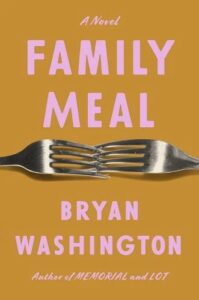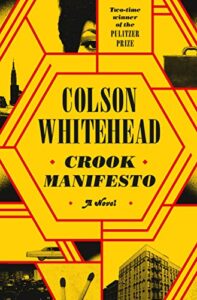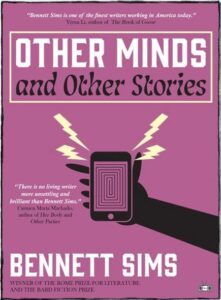Fiction. 320 pgs. Riverhead Books. October 2023. 9780593421093.
In his latest novel, Black queer author Bryan Washington remakes the world in his own image. Family Meal (October 2023, Riverhead Books)—like Memorial (2020) before it and Lot (2019) before that—immerses the reader into the subjectivity of Washington’s fat, queer, Black and mixed-race narrators. I love Washington’s stories for many reasons: his use of blank space, the playfulness in his intimacy, the emotional range of his characters. I also love reading Washington’s work because it transports me back to my experience of living in Houston, one of the most racially and socioeconomically diverse cities in the United States.[1] I’m a white woman who grew up in the upper-middle-class-Caucasian bubble of Boulder, Colorado. When I moved to Texas in my early twenties, Houston taught me my assumptions of white normativity were inaccurate and insufficient for life in a diverse world. Family Meal is not primarily concerned with my reaction to the story, but it reenacts this lesson anyway, by centering characters who are so often relegated to the margins.
Family Meal is narrated, for the first portion of the book, by Cam, who’s recently moved back to Houston following his boyfriend’s unexpected death. There, Cam runs into TJ, his half-Korean, half-Black estranged childhood best friend, who narrates most of the second half of the novel. The deceased boyfriend, Kai—a Black guy from Louisiana who worked as a Japanese translator—narrates two brief, poetic sections, which are peppered with photographs of flowers. The book is pithy and fragmented, moving through time and space, as the primary characters labor to reestablish relationships of mutual care.
Even as the story is firmly rooted within the lives of these queer Black men, the governing forces of the story-world remain racist, classist, and homophobic. Kai and TJ both navigate strained relationships with family because of their queerness. After TJ’s father catches him, as a teenager, fooling around with Cam, his mother Mae starts asking more pointed questions. “You know you can tell me anything, right? And that it’ll be fine?” She presses. “But this was the thing,” TJ reflects: “I didn’t want to tell her anything.
“I didn’t want to explain or justify.
I didn’t want to be accepted or tolerated.
I wanted to just be.”[2]
Kai, in the absence of his family’s tolerance, stops visiting his mother and sister in Louisiana. “If it makes you feel better,” Cam offers, “we can pretend that I met them, and they liked me. We can pretend that they accepted you.”[3] Queer life often involves this alternative world-building, evidenced by chosen family structures and parallel social spaces (such as the gay bar where Cam works). As Kai reminds Cam (and the reader), “There’s no clock for coming out. No one way to be queer.”[4]
The novel is committed to the multiplicity embedded in “no one way,” and it depicts a wide range of non-heteronormative relationship configurations. There are no straight white characters here. Fati, who works at TJ’s family’s bakery, “quit her father’s Sugar Land dentistry, married her live-in boyfriend, and immediately declared that she was only interested in polyamory.”[5] Desire, clear communication, and respect are prioritized over adherence to any kind of traditional romantic model. The relationships portrayed are queer, open, closed, communicative, iterative, and multimodal. Plus there’s a whole lot of extemporaneous fucking.
Washington eschews one-dimensionality in nearly every regard, except when it comes to white people. “In so much contemporary American fiction,” Washington has observed, “whiteness is the standard assumption…You go 200, 300 pages without a white character being called white.”[6] Across his entire oeuvre, Washington refuses to allow whiteness to go unnamed, undermining this sense of whiteness as default. One of his signatures is to render “whiteboy” as one word. White folks figure minimally in scenes from the novel. When they appear, they are wandering drunkenly through parts of town they don’t know well (displaying an insulting assurance of safety) or knocking on the windows of a steamed-up sedan to ask two post-coital lovers if the car is their Lyft[7]—instances that might be funny to a reader not already fatigued by white ignorance and presumption. These depictions make me sweaty, uncomfortable with the recognition of my younger self. When I first arrived in Texas, I asserted myself with impunity in places where I didn’t belong, not even bothering to consider my safety because I’d never been taught to question it. That version of myself appears in Washington’s Memorial, when he mentions that “the block has recently been invaded by…rich kids playing at poverty.”[8] When I read that, I nearly threw the book across the room. A violent reflex to separate myself from the shame of being so directly named. Distance allows me now to admit that yes, that’s basically what I was doing then. But seeing myself sketched as a nameless bystander in the background of someone else’s story made me defensive. I had to unlearn the entitlement of believing that my perspective always matters. I had to learn (slowly, and often ungracefully) that certain spaces were not for me. There is an echo of that white presumption of welcome even now, in writing this. Washington’s work asks, who gets the benefit of the doubt? Who gets to explain themselves? Who gets to be depicted with complexity?
Even in the absence of Caucasian characters, Family Meal is shadowed by the presence of whiteness and its attendant threats. It’s because of whiteness—white fear and white justification—that Kai is dead. The specific circumstances of his sudden death are withheld until halfway through the book, then revealed in a devastating section Cam opens by saying, “I’ll only tell you once.”[9] In the absence of a coherent narrative that recognizes the wrongness of Kai’s death, Cam blames himself. He abandons Los Angeles, where he and Kai lived together, and returns to Houston. But much of the life Cam establishes there is also jeopardized by whiteness and capitalism, in the form of gentrification. Time is tracked by racial and economic shifts, and whiteness and wealth are often conflated: “before money found the Heights and turned the block pale.”[10] Cam settles into a routine working at the gay bar, but it falls prey to rising property rents that affect the entire area. Montrose (in both the book and real life) is Houston’s historic gayborhood, but its proximity to downtown—strung like a bead along a major transit corridor—makes it a prime target for urban redevelopment. “Lately it’s all ice-cream parlors and pop-up boutiques and twelve-dollar coffees on overgrown patios,” Cam describes, “but a few years back, you wouldn’t catch white boomers walking down Fairview or Dunlavy or Hazard in broad daylight for anything.”[11]
Washington captures Houston’s exuberant diversity: its bizarre urban collages, cultural cross-pollination, gastronomic fusion. After the closure of the bar, the narrative settles on the bakery that TJ’s parents ran out of their house. “The property sits on a tidy block bundled by bungalows,” Cam narrates, “flanked by a dive bar and a loan shark and some crumbling one-story apartments. There’s a Lao restaurant and a florist and a McDonald’s. The street’s tapered off by a bail-bonds shop. Turn west, and you’ll hit a row of glossy boutiques…
“But most of the homes I walked by as a kid are long gone.”[12] His descriptions are rich with affection and tinged with mourning. Houston is distinct partially due to its lack of zoning laws, which allows for the proliferation of blocks like the one described above. There are notoriously few protections against redevelopment, so the built landscape is constantly changing.
Houston loves to tout itself as the city of the future, with no majority racial or ethnic group.[13] The city has already undergone many of the demographic changes that are predicted for the United States nationwide in the next twenty to thirty years.[14] As of 2015—the year I moved there—less than 40% of the population in the Houston-Galveston region was white.[15] Adapting to Houston involved the displacement of my worldview. Whereas I’d previously often assumed the whiteness of people around me and projected my perspective onto the world at large, I came to recognize that my way of moving through the world was just one way, not necessarily any more legitimate or universal than anyone else’s.
Washington never pauses to explain anything to the reader. His work is constantly navigating the power of the unspoken: the details of Kai’s death, Cam’s disordered eating and substance use, TJ’s status as “poz undetectable.”[16] By not including any literary double-takes, Washington creates a world where queer characters don’t have to explain themselves. The novel reflects race as a complicated and visible—but not comprehensive—aspect of one’s identity. TJ, son of a Black mother and Korean father, nods to the double-bind of racial ambiguity and others’ expectations: “I’ll find out…that he’s only into fucking Black guys if they top him, or only into fucking Asian guys if they bottom.”[17] These characters flout stereotypes. Cam marvels at Kai’s translation abilities, describing him as “a lumpy Black dude chatting with these hundred-year-old Asians about the way that snow falls halfway across the world. I didn’t get it either.”[18] In a sweet reprise, Kai is delighted by Cam’s skills in the kitchen. “He looked like some guy off the street,” Kai says, “and then there’s this fucking Michelin spread.”[19] Washington’s characters, like his stories, contain multitudes.
Because whiteness operates as “the great unsaid,”[20] white writers are rarely perceived to be writing about race, even though race and privilege are equally as determinative in white stories as any other story. By centering Black, queer subjects, Washington’s work brings a necessary corrective to the normativity that saturates mainstream fiction. “The vantage point is not whiteness,” Washington has said of his work. “It is not the dominant frame through which I’m writing my narratives. I’m not looking for anyone to pick up one of my texts and see or learn how their whiteness is refracted against any of the communities that are depicted.”[21] Washington’s books are not meant to facilitate my journey of self-reflection—which makes me question if this entire essay is self-indulgent. Washington’s books are not meant for me at all. My reception of his writing is as irrelevant as the whiteboys on the periphery of his scenes. And yet: how else can I reflect on the book other than to offer a reading foregrounded in my own experience? What reaction do I have that is not filtered through my own subjectivity? Reading Family Meal echoed what it felt like to have my white, heteronormative worldview eclipsed by a dynamic multiracial landscape. Family Meal is a beautiful novel about care and tenderness and what love looks like. For a white reader like me, having my subjectivity sidelined becomes part of the experience of the book. I’m hungry for more work like Washington’s, stories that invite me out of myself.
[1] Sharaki Briggs, “Houston is one of the most diverse cities in the U.S., says new report,” Houston Chronicle, April 24, 2024. https://www.houstonchronicle.com/news/houston-texas/trending/article/houston-racial-diversity-cities-us-19418229.php
[2] Bryan Washington, Family Meal (New York: Riverhead Books, 2023), 224.
[3] Washington, Family Meal, 103
[4] Washington, Family Meal, 10.
[5] Washington, Family Meal, 165.
[6] In an interview with Rosemary Ho, “Bryan Washington on Fiction ‘Outside the Bounds of Trauma,” from The Nation, November 25, 2020, https://www.thenation.com/article/culture/bryan-washington-on-fiction-outside-the-bounds-of-trauma/tnamp/
[7] Washington, Family Meal, 257.
[8] Bryan Washington, Memorial (New York: Riverhead Books, 2020), 10.
[9] Washington, Family Meal, 126.
[10] Washington, Family Meal, 181.
[11] Washington, Family Meal, 29.
[12] Washington, Family Meal, 50.
[13] From the Greater Houston Partnership; Data, Insight, & Analysis on Demographics – Race & Ethnicity, published October 2022, https://www.houston.org/houston-data/demographics-raceethnicity#:~:text=No%20racial%2Fethnic%20group%20constitutes,Statistical%20Area%20(Houston%20MSA).
[14] Hu, Elise. “In Houston, America’s Diverse Future Has Already Arrived,” National Public Radio, July 01, 2013, https://www.npr.org/sections/itsallpolitics/2013/07/01/195909643/tx2020-houston-racial-ethnic-diversity-americas-future
See also, “Houston Area Survey,” from the Kinder Institute for Urban Research at Rice University, https://kinder.rice.edu/initiative/kinder-houston-area-survey
[15] From “Demographic and Socio-Economic Changes in Houston-Galveston Region,” released by Houston-Galveston Area Council Regional Data Lab, datalab.h-gac.com/houstongrowth/index.html
[16] Washington, Family Meal, 232.
[17] Washington, Family Meal, 215.
[18] Washington, Family Meal, 9.
[19] Washington, Family Meal, 137.
[20] Thandeka, Learning to Be White: Money, Race, and God in America. (New York: Continuum International Publishing Group, 1999). Referenced by David Mura in “Notes on Questioning Whiteness as a Literary Practice,” in Gulf Coast online, April 23, 2015, https://gulfcoastmag.org/online/blog/whiteness-as-literary-practice/
[21] In an interview with Rosemary Ho, “Bryan Washington on Fiction ‘Outside the Bounds of Trauma,” The Nation, November 25, 2020, https://www.thenation.com/article/culture/bryan-washington-on-fiction-outside-the-bounds-of-trauma/tnamp/
Family Meal is available through Riverhead Books. Purchase it now through your local bookstore.
Like what you’re reading?
Get new stories or poetry sent to your inbox. Drop your email below to start >>>
NEW book release
Direct Connection by Laura Farmer. Order the book of stories of which Mike Meginnis says there is “an admirable simplicity at their heart: an absolute, unwavering confidence in the necessity of loving other people.”
GET THE BOOK



